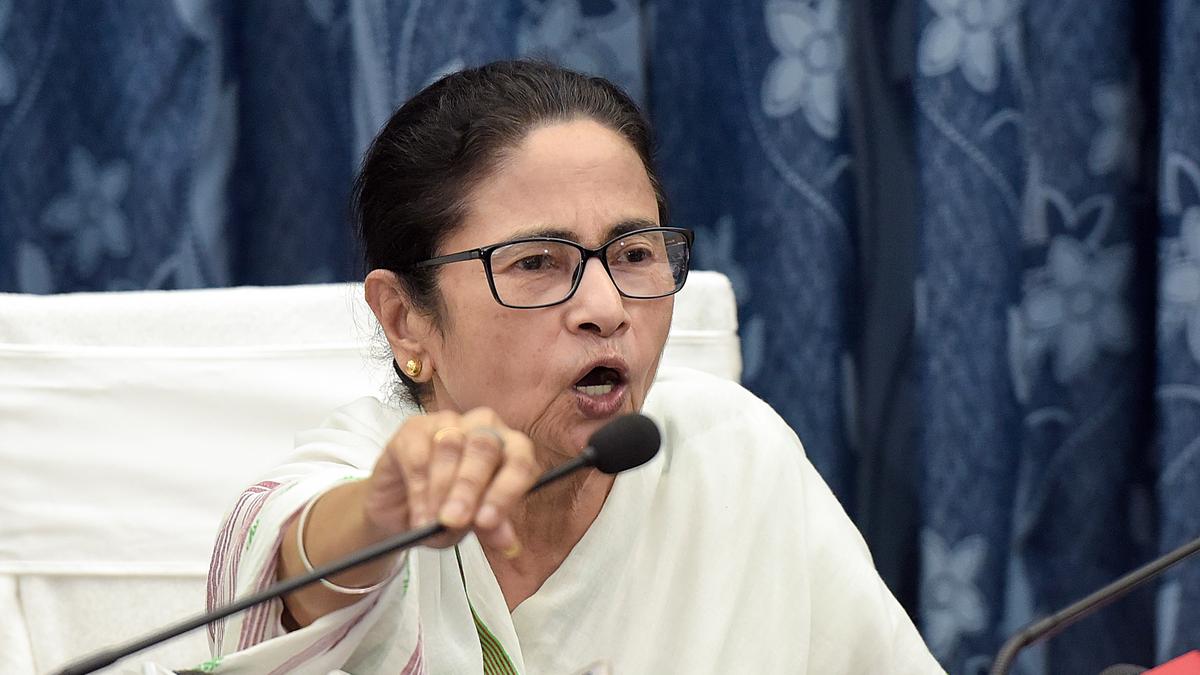File photo of West Bengal Chief Minister Mamata Banerjee
| Photo Credit: ANI
On February 10, when West Bengal Governor C.V. Ananda Bose was addressing the State Assembly, the Bharatiya Janata party MLAs led by Leader of Opposition Suvendu Adhikari took objection to the mention of Jal Swapna scheme. The LOP told journalists that the State government has changed the name of the Central government’s Jal Jeevan Mission to Jal Swapna scheme and that he will write to the concerned Ministry to stop funding the scheme.
The stoppage of funds from the Centre to key schemes has dominated politics of West Bengal over the past several years with funds to MGNREGA being suspended since December 2021. Chief Minister Mamata Banerjee also claims that funds to PM Awaas Yojana and the Pradhan Mantri Gram Sadak Yojana have been stopped.
Over the past few years several delegations of Trinamool Congress leadership have made representations before ministries and even held protests but the Union government has remained defiant alleging widespread corruption in disbursement of schemes including MGNREGA.
In December 2024, Ms. Banerjee announced the Banglar Bari scheme on Tuesday to provide houses for the rural poor in the State. In the first phase the State government has earmarked ₹14,000 crore for 12 lakh beneficiaries and in the Budget for 2025-26 additional ₹9,600 crore for additional 16 lakh beneficiaries. The Budget 2025-26 also saw the allocation of ₹15,000 crore for the Pathashree a scheme for construction of 37,000 km rural roads in the State.
One of the highlights of the West Bengal government Budget for 2025-26 included allocation of ₹200 crore for purchase of smart phones for about 70,000 ASHA (Accredited Social Health Activists) and Anganwadi workers.
While there was no increase in the cash incentives given to women under the Lakshmir Bhandar scheme in the Budget, the Chief Minister said that her government will increase the beneficiaries under the cash incentive scheme whose numbers have climbed 2.21 crore so far. Ms. Banerjee said that her government has so far allocated ₹50,000 crore for Lakshmir Bhandar scheme alone, where (₹1,000 for general and ₹1,200 for reserved category) is given to every women who is less than 60 years.
“Our scheme provides universal coverage, where everyone who applies gets benefit. We do not have any conditions,” Ms. Banerjee said. She highlighted that certain others states have started reducing the number of beneficiaries in the cash incentive schemes. The list of beneficiaries in Kanyashree Prakalpa (scholarship for school going girls) is about one crore and ₹15,000 crore has been allocated so far. Under the Sabuj Sathi scheme (distribution of bicycles to school going students) the number of beneficiaries is 1.26 crore students and allocation of ₹4,600 crore has been made.
The Mamata Banerjee government claims that half of the State government’s Budget is allocated for the benefit of women and children. In the Budget 2025-26 the allocation for gender specific schemes was hiked to ₹1.18 lakh crore from about ₹85,000 crore from 2024-25.
The allocation of schemes that directly transfer cash to the electorate particularly women in the State, has helped Mamata Banerjee reap political dividends since 2021 and now become a political compulsion for the Trinamool Congress. These schemes are a necessity for the West Bengal’s ruling party to hold on power in the State.
The Mamata Banerjee led government realises the need for creation of jobs and not only Budget 2025-26 but recently concluded Bengal Global Business Summit, 2025 put lot of emphasis on creation of employment. However, with the Centre’s fund freeze putting stress on the coffers of the State government, Ms. Banerjee has little leeway to make room for creation of infrastructure required for attracting big ticket investment and will have to continue disbursing cash to the electorate.
Many also see the fund freeze not only an outcome of strain in Centre State ties but also as a political tool by the party in power at the Centre to exhaust resources of the State government so that the electorate can look at other alternatives. The Trinamool Congress leadership, however, remains unfazed and continues to fund populist schemes particularly that involve direct benefit transfer to women and children.
The political circles in the State are also rife with speculation that before West Bengal goes to polls in 2026, the electorate can expect the hike in cash incentives and new populist schemes.
Published – February 15, 2025 09:46 pm IST
